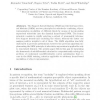Free Online Productivity Tools
i2Speak
i2Symbol
i2OCR
iTex2Img
iWeb2Print
iWeb2Shot
i2Type
iPdf2Split
iPdf2Merge
i2Bopomofo
i2Arabic
i2Style
i2Image
i2PDF
iLatex2Rtf
Sci2ools
116
click to vote
MCS
2010
Springer
2010
Springer
A Support Kernel Machine for Supervised Selective Combining of Diverse Pattern-Recognition Modalities
Abstract. The Support Kernel Machine (SKM) and the Relevance Kernel Machine (RKM) are two principles for selectively combining objectrepresentation modalities of different kinds by means of incorporating supervised selectivity into the classical kernel-based SVM. The former principle consists in rigidly selecting a subset of presumably informative support kernels and excluding the others, whereas the latter one assigns positive weights to all of them. The RKM algorithm was fully elaborated in previous publications; however the previous algorithm implementing the SKM principle of selectivity supervision is applicable only to real-valued features. The present paper fills in this gap by harnessing the framework of subdifferential calculus for computationally solving the problem of constrained nondifferentiable convex optimization that occurs in the SKM training criterion applicable to arbitrary kernel-based modalities of object representation.
Related Content
| Added | 29 Jan 2011 |
| Updated | 29 Jan 2011 |
| Type | Journal |
| Year | 2010 |
| Where | MCS |
| Authors | Alexander Tatarchuk, Eugene Urlov, Vadim Mottl, David Windridge |
Comments (0)

